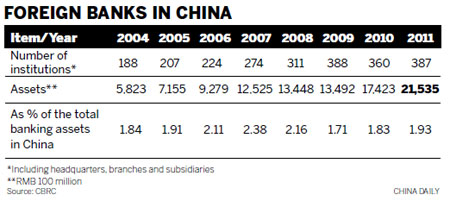Overseas lenders eye golden opportunities in China
Updated: 2012-07-18 08:03
By Wei Tian (China Daily)
|
||||||||

Foreign banks saw their profits in China double in 2011 and expect at least 20 percent annual revenue growth over the next three years despite a bleak economic outlook, a survey by PricewaterhouseCoopers said on Tuesday.
A total of 181 foreign banks in China reported a combined revenue growth from 7.78 billion yuan ($1.22 billion) in 2010 to 16.73 billion yuan in 2011, according to the PwC's seventh annual report of foreign banks in China.
The total assets of foreign banks in China also grew 24 percent to 2.15 trillion yuan over last year, and accounted for about 2 percent of the total assets in China's banking sector. The share is up from a decline during 2008, which was the result of massive liquidity injected into Chinese banks.
Although China's economic outlook was shadowed by a series of weak data recently, annual revenue growth of 20 percent or more until 2015 is still in the sights of the 41 CEOs, senior executives, and branch managers surveyed.
The foreign banks have set their own sights on four target growth areas: financial institutions, multinational corporations, State-owned enterprises and private-owned enterprises. Debt capital market is expected to offer the greatest opportunity.
Facing a talent shortage, many foreign banks are on an aggressive recruitment drive, aiming to increase the industry's headcount by 56 percent to 55,000 by 2015 from the current 35,000.
"The significant growth (in profit) was a result of strong demand for corporate credit from multinationals expanding within China and an increasing number of State and private-owned enterprises customers," said Jimmy Leung, banking and capital market leader with PwC China.
He added that the internationalization of the renminbi has generated a strong demand and growing revenue in derivatives, which also helped drive results.
The central bank's recent advancement on interest-rate liberalization is also viewed as advantageous, as foreign banks can now compete with more flexibility, Leung said.
"The exponential growth in the number of high net-worth individuals in China is leading some foreign banks to renew and develop their retail and wealth-management businesses," said Raymond Yung, PwC China financial services leader.
"Many foreign banks, which set up their China offices during 2007 and 2008, were focusing on staff recruitment and infrastructure. Now that those are in place, it's time to seek a return on the investment," said Charles Chow, PwC China assurance partner.
The strong results were achieved despite barriers such as lending caps and a relatively slow pace of new-branch approvals, PwC's report said.
The strict regulatory environment continues to be a major concern among bankers. Relaxed regulatory restrictions on bond underwriting, access to the derivatives market and wealth-management market, as well as a higher quota of offshore funding are on the respondents' wish lists.
But surprisingly, the participants surveyed consider the China Banking Regulatory Commission a more supportive regulator than even their own respective home regulators.
"In the long run, foreign banks in China will be in a better position if they continue to view and engage with regulators like any key client relationship," the report said.
The fundamental challenge for the foreign banks over the next three years will be balancing the investment and needs of a dynamic and fast-developing Chinese market against the constraints of a slowing economy back home.
"China is shifting away from a production-export market to a domestic consumption-driven economy, which means new opportunities for foreign banks to diversify into emerging-market sectors such as IT and clean energy as they mature," the report said.
"They will also be able to leverage their global expertise as more Chinese firms seek to expand offshore. Capitalizing on this will require a different and more focused approach to their China strategy."
Foreign banks are also supportive of Shanghai's plan to become an international financial center by 2020 and believe they can play a major role in making it happen. Foreign banks hold a market share of 12 percent in Shanghai. However, only half of them have active plans regarding Shanghai.
"In order for Shanghai to really claim to be an IFC, the liberalization of interest rates and the RMB exchange rate is critical," Leung said.
weitian@chinadaily.com.cn
(China Daily 07/18/2012 page14)

 Relief reaches isolated village
Relief reaches isolated village
 Rainfall poses new threats to quake-hit region
Rainfall poses new threats to quake-hit region
 Funerals begin for Boston bombing victims
Funerals begin for Boston bombing victims
 Quake takeaway from China's Air Force
Quake takeaway from China's Air Force
 Obama celebrates young inventors at science fair
Obama celebrates young inventors at science fair
 Earth Day marked around the world
Earth Day marked around the world
 Volunteer team helping students find sense of normalcy
Volunteer team helping students find sense of normalcy
 Ethnic groups quick to join rescue efforts
Ethnic groups quick to join rescue efforts
Most Viewed
Editor's Picks

|

|

|

|

|

|
Today's Top News
Health new priority for quake zone
Xi meets US top military officer
Japan's boats driven out of Diaoyu
China mulls online shopping legislation
Bird flu death toll rises to 22
Putin appoints new ambassador to China
Japanese ships blocked from Diaoyu Islands
Inspired by Guan, more Chinese pick up golf
US Weekly

|

|






